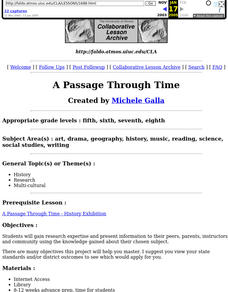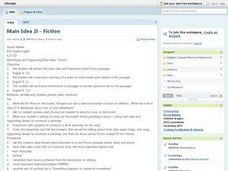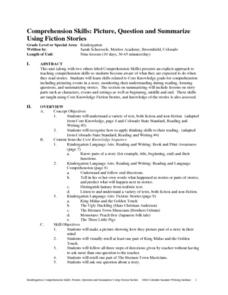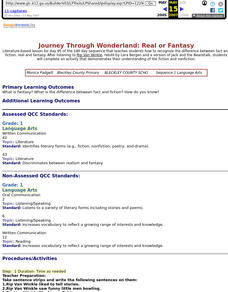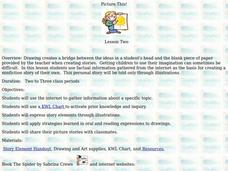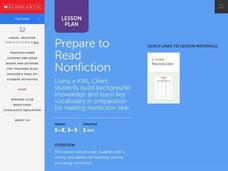Curated OER
A Passage Through Time
Young learners research and present information about a chosen subject to their peers, parents, instructors, and community. This lesson has a strong research and public speaking component, and would be ideal for your higher level students.
Curated OER
Independent - To Be or Not Top Be - Day 1, Lesson B: To Arms!
Fifth graders explore the verbal and non-verbal parts of an oral presentation.
Curated OER
Main Idea- Fiction
Eighth graders investigate the concept of main idea and supporting details, and how they are used in the genre of fiction. In this literacy lesson, 8th graders listen to a fictional passage and take notes on the characters, setting,...
Curated OER
Comprehension Skills: Picture, Question and Summarize Using Fiction Stories
Students build a variety of comprehension skills through the nine lessons of this unit. Picturing events, monitoring understanding during reading, forming questions, and summarizing stories form the core of the lessons being taught in...
Curated OER
Journey Through Wonderland: Real or Fantasy
First graders recognize the difference between fact and fiction, real and fantasy. After listening to Rip Van Winkle, retold by Lara Bergen and a version of Jack and the Beanstalk, 1st graders demonstrates their understanding of fiction...
Curated OER
Tall Tales: Read, Write, Draw and Sing
Students get to know the characters and events that shaped American folktales through writing, drawing and singing activities. Handouts and worksheets are included.
Curated OER
Persuasive and Emotive Language Lesson Plan
Students explore persuasive language. In this emotive language lesson, students consider the use of language that incites readers as they participate in reading and writing activities that require them to describe a tourist attraction,...
Curated OER
Lesson Two: Discover a purpose for keywords
Second graders research a topic in nature. For this research lesson, 2nd graders pick a nature topic and discuss the keywords needed to find more information about that topic. They fill their information out on a organizer.
Curated OER
Picture This
Students explore finding facts from the Internet to create a nonfiction story. In this writing activity, students fill out KWL charts and do internet research about the given topic of spiders. Students then create and illustrate their...
Curated OER
Heroes, Legends and Folktales
Fourth graders read classic stories including "The Magic Brocade" and "St. George and the Dragon". They complete a series of lessons in which they compare stories and produce original narrative legends.
Curated OER
5 W Questions
Second graders practice asking the 5 W questions by reading a Boxcar Children book. In this journalism lesson, 2nd graders read a single story from the Boxcar Children series and answer the 5 W's about each specific chapter. Students...
Curated OER
Sequencing
High schoolers consider how cause and effect translate into sequencing in literary works. In this sequencing lesson, students read non-fiction passages about Eleanor Roosevelt and Clara Barton. High schoolers complete graphic organizers...
Curated OER
The Rest Cure: Gender in Medicine and Literature
Read and discuss "The Yellow Wall-Paper" and the gender issues that the story brings up. Use articles from the time period to analyze, complete with specific discussion questions. After two days, scholars write an essay based on topics...
Curated OER
Biography: Telling Someone's Life Story
There are many different ways to help your students get excited about writing biographies.
Curated OER
Different Genres In Literature
Third graders view different genres of literature and identify which genre is being presented to them. In this genres lesson plan, 3rd graders choose from fiction, non fiction, and a poem.
Curated OER
Just the Facts, Ma'am
Learners use tables of content, chapter titles, and key words as a strategy for organizing non-fiction information. They write a paragraph with a partner using information from a graphic organizer.
Curated OER
Reading Research!
Young scholars observe the pictures in non-fiction books that focus on animals in the winter. In addition, they also listed to some read aloud books about hibernation, migration, adaptation and dormancy. Students draw pictures and write...
Crafting Freedom
Sequencing of Events in the Slave Narrative of Henry "Box" Brown
What steps did Henry "Box" Brown take while planning his own escape from slavery? Learners work in groups to analyze segments of Brown's narrative and identify the sequence of the most important events of his story.
Curated OER
"Spelldown" by Becky Mushko
Learners read Spelldown, by Becky Mushko and consider how it portrays the Appalachian community. They define and discuss vocabulary presented in the story and write a comparison/contrast paper analyzing two of the story's characters. The...
EngageNY
TASC Transition Curriculum: Workshop 12
How can opinions slant facts? Workshop participants learn how to examine primary and secondary sources and identify the author's point of view. They also examine how visual art impacts the meaning and rhetoric of sources. Full of...
Curated OER
Learning About Evaluation
Young scholars evaluate the essays of their classmates. In this evaluation lesson, students write two non-fiction essays on two different topics that they may choose. After a lecture on the aspects of the paper that will be evaluated,...
Curated OER
How-To Books
Students apply their knowledge and create a how-to book of their own. In this early childhood language arts worksheet, students learn about non-fiction books and write their own procedural non-fiction booklets.
Curated OER
Immigration to the United States
Students discover the implications of immigration. In this immigration lesson, students read fiction based on immigration experiences as well as non-fiction on the topic. Students write and share book reviews of the literature they read.
Curated OER
Prepare to Read Nonfiction
Young scholars get an introduction to using KWL Charts as tools for reading nonfiction. They study unfamiliar words and share what they already know about the topic of the non-fiction selection and use this knowledge to help prepare to...


